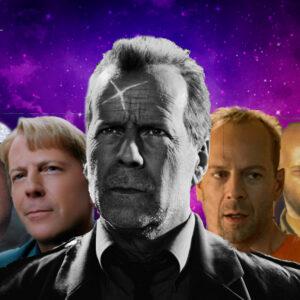Introduction: A New Chapter for Emilia Clarke
Emilia Clarke, renowned for her groundbreaking portrayal of Daenerys Targaryen in Game of Thrones, has long been a name synonymous with powerful drama and intense performances. From the Iron Throne to the hearts of audiences worldwide, Clarke’s career seemed to be defined by her ability to tackle some of the most complex and emotionally charged roles in television history. Yet, in her latest project, The Pod Generation, Clarke is making an unexpected yet exciting return to the world of sci-fi and comedy, marking a significant departure from the gravitas of her previous roles.
After years of playing the dragon-riding, power-hungry queen on Game of Thrones, Clarke’s move to a quirky, futuristic comedy may come as a surprise to many. But in a way, this project reveals just how versatile and fearless Clarke has become in her craft. In this article, we will explore how Clarke’s career has evolved, what makes The Pod Generation so distinct, and why this sci-fi comedy is the perfect vehicle for the actress to explore new dimensions of her talent.
Emilia Clarke’s Career Evolution
Emilia Clarke’s rise to stardom was nothing short of meteoric. When she was cast as Daenerys Targaryen in Game of Thrones in 2010, Clarke was a relatively unknown actress, yet her portrayal of the Mother of Dragons made her one of the most recognizable faces in Hollywood. For nearly a decade, she embodied the evolution of a character who started as a timid girl sold into marriage and transformed into a force of nature, one of the most powerful women in the fictional world. Daenerys was an iconic role that required Clarke to delve deep into a range of emotions, from vulnerability to fierce determination, and it was a performance that earned her multiple award nominations, solidifying her place in television history.
Following Game of Thrones, Clarke faced the inevitable challenge of escaping the shadow of Daenerys. The role had become so synonymous with her that many wondered whether she could step into different kinds of characters. However, Clarke quickly demonstrated her range. She starred in films such as Me Before You (2016), where she brought warmth and tenderness to a romantic drama, and in Solo: A Star Wars Story (2018), playing Qi’ra, a character caught between the allure of power and the pull of love. These roles showcased her ability to step into different genres, from heartfelt romance to the action-packed universe of Star Wars. But it was her turn in the dark comedy Last Christmas (2019), where she paired her comedic timing with an unexpected emotional depth, that marked her first major foray into lighter, more humorous roles.
In recent years, Clarke has deliberately chosen projects that allow her to stretch as an actress and avoid being typecast. Her decision to return to the world of sci-fi and comedy in The Pod Generation is the next logical step in her career—a move that further establishes her versatility as a performer willing to embrace the unknown and push her boundaries.
The Pod Generation – What Is It About?
The Pod Generation is a thought-provoking yet humorous exploration of the future of family-building through technological innovation. Set in a world where artificial wombs, referred to as “pods,” are used to gestate children, the film presents a society where technology has radically transformed human reproduction. This near-future setting offers a fertile ground for The Pod Generation to delve into complex social and ethical questions, while also using humor to examine contemporary issues.
Clarke plays Rachel, a woman who embarks on a journey to have a child through this new technology. As the film progresses, we follow Rachel and her partner Alvy (played by Chiwetel Ejiofor) as they navigate the intricacies of a world where the natural process of pregnancy is replaced by the technological marvel of “pod” pregnancies. The film explores themes of artificial intelligence, the impact of technological advancements on personal relationships, and the shifting dynamics of gender and family roles in a world where women are no longer required to bear children the traditional way.
At its core, The Pod Generation is an exploration of how society, relationships, and gender roles might change in the face of technological breakthroughs. Clarke’s role as Rachel allows her to portray a woman who is grappling with the implications of this new way of building a family, providing a fresh perspective on how technology might shape human experiences in the not-so-distant future.
Clarke’s Return to Sci-Fi and Comedy
Emilia Clarke’s return to the sci-fi genre is a particularly noteworthy aspect of her career evolution. While Game of Thrones had elements of fantasy, it was rooted in a historical and political world that bore little resemblance to the far-flung technological future of The Pod Generation. Clarke’s previous experience with sci-fi in Solo: A Star Wars Story allowed her to dip her toes into this genre, but The Pod Generation marks a more significant return to the speculative fiction world. This time, however, she’s not wielding dragons or leading armies; instead, she’s exploring the lighter side of sci-fi through the lens of comedy.
What sets Clarke’s return to sci-fi apart in The Pod Generation is the film’s unique blend of futuristic technology with comedic elements. The narrative of artificial wombs is one that raises serious questions about the future of family life, yet the filmmakers wisely incorporate humor to engage the audience without making light of the topic. Clarke’s performance in this setting is a refreshing departure from the intensity of her Game of Thrones days. Here, she gets to explore a more playful side of herself, injecting humor and warmth into her character. This marks a shift in Clarke’s career—one that proves she can shine not only in dramatic roles but also in lighter, more comedic performances.
The juxtaposition of sci-fi with comedy is something that makes The Pod Generation stand out in the genre. Sci-fi has often been a space for dystopian narratives and complex explorations of the human condition, but The Pod Generation uses humor to approach similar themes. Clarke’s ability to balance the serious undercurrent of the film’s themes with her character’s light-heartedness showcases her versatility as an actress and allows her to broaden her appeal across different genres.
The Relevance of The Pod Generation
The Pod Generation isn’t just a film about futuristic technology—it’s a reflection of the present moment. By using sci-fi to explore issues like reproductive rights, technological dependence, and gender equality, the film offers a commentary on the world as it stands today. The artificial wombs of the film may seem fantastical, but they raise real-world questions about the role of technology in shaping our future, particularly in the realm of family planning and gender dynamics.
In an era where reproductive rights and the intersection of technology and biology are hot-button issues, The Pod Generation could serve as a catalyst for important conversations. The film asks: What happens to relationships when the natural process of childbirth is outsourced to technology? How does this shift affect the roles of women and men in the family unit? These are questions that go beyond the realm of science fiction, sparking dialogue about our evolving relationship with technology and its implications for human life.
Clarke’s character Rachel, who is navigating these new societal norms, becomes a relatable lens through which the audience can reflect on these issues. Her journey is not just a personal one but also a commentary on the changing landscape of family-building and gender roles in the 21st century.
Clarke’s Impact on the Genre
Emilia Clarke’s involvement in The Pod Generation signals an exciting development for both the sci-fi and comedy genres. Historically, sci-fi has been dominated by male protagonists, with women often relegated to supporting or secondary roles. However, in recent years, the rise of strong female leads in sci-fi films has reshaped the genre. Clarke, who has already proven her strength as a leading lady in fantasy and drama, brings that same level of depth to sci-fi, showcasing the growing prominence of women in the genre.
Moreover, Clarke’s transition from the intense drama of Game of Thrones to the playful humor of The Pod Generation reflects a broader trend of genre-crossing in Hollywood. As the industry becomes more open to blending genres, female leads like Clarke are finding new ways to carve out space for themselves. In a film that explores futuristic concepts with humor and heart, Clarke’s presence is a reminder of the power of strong female performances in both science fiction and comedy.
Conclusion: A New Era for Emilia Clarke
Emilia Clarke’s role in The Pod Generation represents more than just a new film project; it signals a new phase in her career. After years of playing dramatic, larger-than-life characters, Clarke is proving she can excel in roles that are lighthearted, comedic, and still deeply human. By embracing a genre-bending film that combines sci-fi and comedy, Clarke is showing the world that she’s not afraid to take risks and explore new creative territory.
The Pod Generation is not just an important film for Clarke—it’s a glimpse into the future of cinema, where sci-fi and comedy intersect, where gender roles are reimagined, and where technology’s impact on society is examined with both humor and depth. For Clarke, this film marks the beginning of what could be an exciting new chapter in her career, one where she continues to break boundaries, redefine expectations, and inspire audiences with her versatility and talent.





